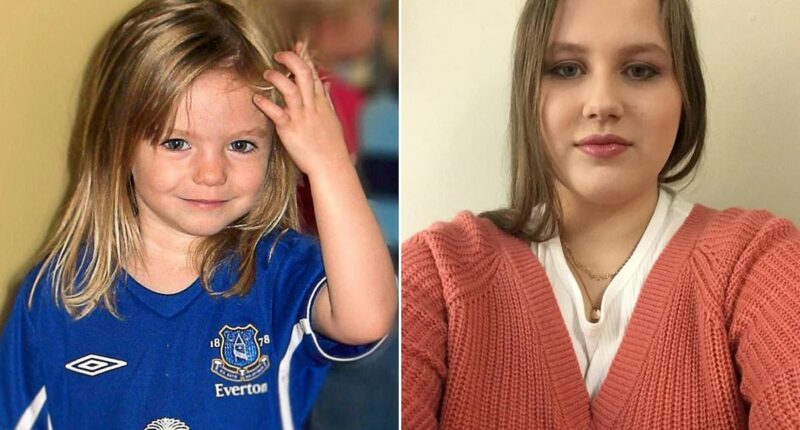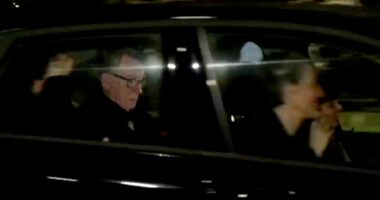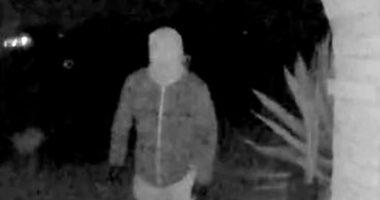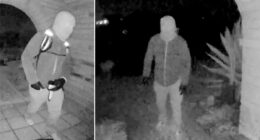Share this @internewscast.com
A Polish woman who claimed to be Madeleine McCann was proven not to be the missing child through a conclusive DNA test, according to the officer leading the investigation.
Detective Chief Inspector Mark Cranwell said a sample was taken from Julia Wandelt when she was arrested in February and compared with Madeleine’s.
Asked what the results showed he replied: ‘A comparison took place and it conclusively proved that Julia Wandelt is not Madeleine McCann.’
The woman, known as Wandelt, aged 24, is currently facing trial for allegedly stalking Madeleine’s parents, Kate and Gerry McCann, between June 2022 and February 2025. She reportedly harassed them with constant phone calls, letters, and messages, asserting she was their daughter, and even showed up at their residence in Rothley, Leics, demanding a DNA test.
The prosecution argues that Wandelt orchestrated an ‘extensive harassment campaign’ against the McCanns, spanning nearly three years, with the assistance of her ‘supporter and confidante’, 61-year-old Karen Spragg. Spragg, also on trial, is accused of eagerly promoting Wandelt’s false claims from last year onwards.
They both deny the charges.

Detective chief inspector Mark Cranwell from Operation Grange, the Met police investigation into the disappearance of Madeleine

Julia Wandelt, 24, was informed of the DNA results in April, the court heard today

Karen Spragg, 61, is on trial alongside Wandelt, accused of stalking the McCanns
During his testimony on Tuesday, Mr. Cranwell, a senior investigator from Operation Grange, the Metropolitan Police’s investigation into Madeleine’s disappearance, stated that by early this year, he believed Wandelt’s behavior constituted harassment.
He recounted his decision to obtain a DNA sample to either confirm or dismiss Wandelt’s claims, acknowledging that this decision was outside of ‘procedure’ and could have ‘potential ramifications’.
He said: ‘It weighed heavily on my mind because this was against policy and procedure’.
He said he was also worried Wandelt would not accept the results and ‘would suggest we have tampered with the sample’.
‘There was a possibility she would never accept she isn’t Madeleine even when provided with scientific proof.’
Mr. Cranwell noted that if news of the police ordering a DNA test emerged, it might encourage a ‘wave of individuals claiming to be Madeleine’. However, he emphasized, ‘I believed it was the right action to take.’

A court sketch of Wandelt and Spragg in the dock at Leicester Crown Court, where they are on trial accused of stalking

Kate and Gerry McCann have both given evidence describing the ‘distress’ Wandelt’s actions have caused them
Asked by Michael Duck KC, prosecuting, what the ‘driving force behind that view was?’ he replied: ‘To get the results to prove that she isn’t Madeleine and inform her of that decision in the hope she may stop her behaviour towards the McCann family’.
Mr Duck said: ‘Do you think that would be achieved?
Mr Cranwell replied: ‘I was skeptical and nervous’.
The court was told the DNA sample would have to be given voluntarily, and Wandelt agreed.
Mr Cranwell said: ‘I was weighing up the best time to take the DNA, I was aware Leicestershire [police] were likely to be arresting her at some point and I made the decision the DNA would be taken on her arrest.’
The sample was taken in February this year after she and Spragg were arrested at Bristol airport.
Asked what the results showed he replied: ‘A comparison took place and it conclusively proved that Julia Wandelt is not Madeleine McCann.’
Mr Cranwell said he and a colleague then visited Wandelt in Peterborough prison on April 1 this year to tell her the results.
He said he told her: ‘A sample was a taken from you when you were in custody.
‘I went on to say your sample was submitted to the laboratory and a profile was established for you.
‘This has now been compared to the profile of Madeleine McCann, they do not match, you are not Madeleine McCann’.
Mr Cranwell said Wandelt asked him about a test she had taken, which she earlier claimed showed was an almost 70 per cent match to DNA found at the crime scene in Portugal.
Mr Cranwell said he told her: ‘I can’t comment on work done by other people.’
‘She also asked me did you really want to find Madeleine? To which myself and colleague Gary replied ‘yes’.
Earlier, Mr Cranwell told the court a total of 12 people had come forward claiming to be Madeleine.
He said Operation Grange was once a ‘full time’ operation.
But he said it had now been reduced to him working on it one day a week, his deputy also working one day a week, and another detective employed for two days per week.
He added the investigation worked with the Portuguese and ‘latterly’ the German authorities – with the ‘German aspect’ including looking into ‘an individual with the initials CB’.
The court heard there were over 42,000 documents in Operation Grange’s current system, with 21,000 ‘nominals’ named – with ‘nominal one’ being Madeleine, and others including police officers, witnesses, and anyone else who had come into contact with the case.
DCI Cranwell added over 11,838 ‘actions’ had been carried out, and more than 22,000 emails received.
Asked by Mr Duck how many times the inquiry had ‘encountered individuals who claimed to be Madeleine McCann’, he replied that nine had been revealed by searching the system with the terms ‘I am Madeleine’, and that a further three were then discovered.
All had come forward after 2021, Mr Cranwell said, with ‘parameters’ put in place after 2022 to ‘triage’ any claims.
In respect of the nine women who were found via the ‘I am Madeleine’ search, he told jurors they ‘looked if anyone had submitted photos and did a visual comparison.
The detective added: ‘Madeleine had a very distinctive eye pigmentation and it was very easy to discount anyone who did not have that pigmentation.
‘Those that did enclose photos, we made an assessment and re-engaged to either get more photos or more background. To establish whether there was a possibility they could be Madeleine McCann.
‘Ultimately I was the decision-maker whether anyone would be suitable for further work.
‘It was almost like a triage process. It was only right that I made those decisions.’
Mr Cranwell said Operation Grange had never taken a DNA profile from a person claiming to be Madeleine, although within the last two months a woman had sent a profile in and asked it to be compared to the sample the inquiry had on file.
He added that was indeed compared ‘because it was an easy process and could put her mind at rest’.
However, Mr Cranwell said: ‘Taking DNA was a last resort. If I got to that stage I was working with or talking to someone who is Madeleine McCann. At that stage it would have been to prove or disprove.
‘My policy decision is we would not taken DNA unless we believed that person was Madeleine. I did not want to set a precedent. If it became known in the media that I had taken the DNA of an individual, I was concerned I would have had a lot of people come forward saying, ‘I was Madeleine’, and set a precedent, and there would be an expectation.’
Asked what his concerns were of the effect on the McCann family of taking DNA from individuals who came forward, he replied: ‘I genuinely had major concerns about approaching the family.
‘That could have raised their hopes and it could have been done multiple times and been quite emotionally damaging and difficult for the family.
‘I had a responsibility to the investigation and family to be prudent with that decision making.’
Asked about what his thoughts were in relation to Wandelt’s claim, Mr Cranwell said: When I make any assessment I base it on age, physical features, and most importantly eye pigmentation. That would be the major criteria, and professional judgement.
‘My initial assessment and subsequent assessment was that she was not Madeleine McCann.
‘My understanding was Julia had a similar eye pigmentation but it was in a different place within the eye. The iris was a different colour as well.
‘On my direction, being completely satisfied that Julia was not Madeleine, I said to DC Mark Draycott please speak to her and inform her we do not believe she is not Madeleine and we are satisfied she is not Madeleine.’
He added that the ‘feedback’ he received was that Wandelt was ‘relieved’.
The court also heard that in February 2023, after Wandelt began contacting the family again, officers showed the McCanns images of her for the first time.
DCI Cranwell said: ‘I genuinely thought if i took and compared and it had been negative i could have explained to Julia she is not Madeleine and it may have stopped this pattern of behaviour
‘The McCann family had seen photos and were satisfied it was not Madeleine.’
But after Wandelt stepped up her alleged harassment and began contacting Madeleine’s siblings, DCI Cranwell said he made a ‘change of decision’ and sought DNA from her.
Last week the court heard Detective Constable Mark Draycott had ruled out Wandelt after studying photos she had sent and comparing them with the missing girl, who had a small blemish called a coloboma of the iris on her right eye.
He added: ‘We were already aware of the condition in Madeleine’s eye.
‘We were able to make that professional opinion relating to that.
‘The experts said it wouldn’t have faded in that time. The medical expertise is that it couldn’t move and couldn’t fade. We had already worked on facial recognition, etcetera, etcetera.’
On Monday, jurors at Leicester Crown Court were played voicemail messages left by Wandelt in which she claimed Madeleine was not dead.
They also heard messages begging Ms McCann for a DNA test, claiming she was a 69.23% genetic match to samples from the ‘crime scene’ contained in the Portuguese police files into Madeleine’s disappearance, which are online.
In one message, she told Ms McCann: ‘You are my mother, it’s science, no one can deny it.’
In another, she said: ‘I am not a scammer, I am your daughter.’
She also explained away differences between her and Madeleine’s appearance by saying she was ‘ugly and fat because of medication I was given’, and claims to remember trying to shout ‘mummy and daddy’ on the night the three-year-old disappeared in Portugal in 2007.
The trial continues.
















